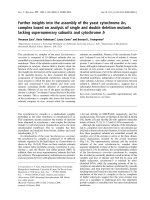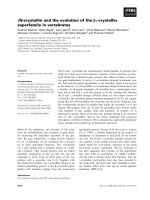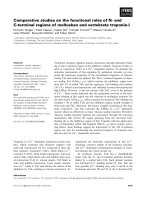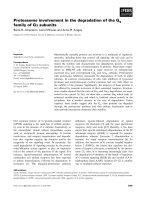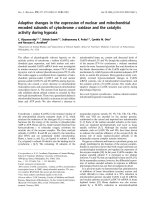Báo cáo khoa học: " Doing research on the ethics of doing research" potx
Bạn đang xem bản rút gọn của tài liệu. Xem và tải ngay bản đầy đủ của tài liệu tại đây (35.63 KB, 3 trang )
Page 1 of 3
(page number not for citation purposes)
Available online />Abstract
In the previous issue of Critical Care Chenaud and colleagues
found that most intensive care unit patients who had given
informed consent for their participation in a clinical trial could not
recall either the purpose of the trial or its related risks several days
later. These findings should remind us that informed consent is a
process, not an event, but they should not be interpreted to mean
that recall is, of itself, a useful criterion for evaluating either the
validity or the quality of the informed consent process. On an
entirely separate note, the decision of the authors not to obtain
informed consent for this study itself raises interesting questions
about the ethics of doing research on the ethics of doing research.
Chenaud and colleagues [1] are to be commended for their
interest in achieving a better understanding of ‘informed consent
for research obtained during the intensive care unit stay’.
Because intensive care medicine consumes an ever increasing
percentage of total health care expenditure, research to define
both its benefits and limitations is a moral imperative. Ironically,
ethical concerns about informed consent for clinical studies in
the intensive care unit (ICU) are making this research
increasingly difficult to conduct, especially in Europe [2-5].
The essential finding of this study is that research participants
in the ICU may have limited capacity to retain and remember
elemental aspects of studies in which they have enrolled. The
authors showed that most ICU patients, when questioned 10
to 12 days after having given their consent for participation in
a study (involving six blood draws over the course of a
month), could not recall the purpose of the trial or its related
risks. These findings are similar to results previously reported
by this same team of investigators in ICU patients who
underwent elective cardiac surgery [6].
What is the message of this study? As emphasized by the
authors, we must remember that informed consent for research
is a process, not an event, and that we have an obligation to
make sure that participants are continually reminded of the
purposes and risks of a study and of their right to withdraw at
any time.
However, does this study call into question the validity of the
informed consent process itself? The authors remind us of
the three mandatory conditions for informed consent for
research, as outlined in the Belmont report [7]: communi-
cation of information about the purposes and procedures
involved in the trial, including its associated risks and
benefits; ensuring that subjects comprehend this information;
and ensuring that subjects are able to provide consent
voluntarily. Of note, none of these conditions require subjects
to be able to recall this information at a later time. In other
words, whether subjects can recall elemental information at a
later date has no bearing on whether the informed consent
was valid. In fact, there are good reasons why this should not
be a factor in determining the quality of the informed consent
process.
First, whether a patient has given a valid informed consent is
a question that can only be asked and answered at the time
when the consent is obtained. Events that happen later in the
patient’s hospitalization cannot make the consent more or
less valid.
Second, ICU patients commonly experience neurologic
derangements that limit their capacity for recall, caused both
by their illnesses and by the medications they have been
administered. Patients who have given their genuine informed
consent under ideal circumstances may therefore be unable
to recall the specifics at a later time.
Third, the severity of the risks associated with the research
may affect whether they can be recalled by subjects at a later
time. For patients with a critical illness, a request for six blood
Commentary
Doing research on the ethics of doing research
Robert D Truog
1,2
1
Harvard Medical School, Department of Social Medicine, Division of Medical Ethics, 651 Huntington Ave, Boston, MA 02115, USA
2
Children's Hospital Boston, Department of Anesthesiology, Division of Critical Care Mediciine, 300 Longwood Ave, Boston, MA 02115, USA
Corresponding author: Robert D Truog,
Published: 19 February 2007 Critical Care 2007, 11:111 (doi:10.1186/cc5684)
This article is online at />© 2007 BioMed Central Ltd
See related research by Chenaud et al., />ICU = intensive care unit.
Page 2 of 3
(page number not for citation purposes)
Critical Care Vol 11 No 1 Truog
draws (as in this study) might have seemed trivial and not
worth remembering.
The irrelevance of recall to the quality of informed consent
can be illustrated by considering a hypothetical clinical trial
that involved administration of a medication that would induce
retrograde amnesia. If subjects could theoretically provide
fully valid consent for a study of this type, as I believe they
could, then the capacity to recall the informed consent
process clearly cannot be a criterion for its validity.
To sum up, this study should remind us that informed consent
is not just an event that occurs at the beginning of a study,
but a process that needs to be continually revisited with
patients during the course of a trial. It would be a mistake,
however, to claim that the inability of patients to recall
elemental features of a trial at a later time is relevant to
judging the quality and validity of the initial consent.
As a final note, it is curious that this study on informed
consent was itself conducted without informed consent. The
authors defend their decision not to obtain informed consent
by noting that they obtained all of their data from the research
database and from administrative files. Clearly, however, the
subjects had given consent only for their data to be used for
the original purposes of the clinical research, and the
investigators neither informed the subjects nor obtained their
permission for these data to be used in a separate study for
an entirely different purpose. As one part of the study, the
investigators asked the subjects questions about their recall
of earlier conversations. Subjects who were asked these
questions were not aware that they were participating in a
research study and were not asked for their informed
consent. Other information was taken from ‘administrative
files’ for research purposes without approval from an ethical
review board. Although I acknowledge that it is very unlikely
that any patients were harmed by their participation in this
research, the question remains as to whether this study on
the ethics of doing research itself satisfied the requirements
of the Belmont report.
The report provides an opportunity to discuss and debate a
great many interesting issues, from the question of how we
measure the quality of the informed consent process to the
issue surrounding the ethical standards that should be
applied to this type of research, and as such is very deserving
of our interest and attention.
Authors’ response
Catherine Chenaud, Paolo Merlani and Bara Ricou
We are grateful to Robert Truog for his interesting and
judicious comments on our report.
Our research article [1] actually resulted from an interesting
finding identified during the conduct of a study on inflam-
mation, in which we had to re-contact the patients 10 to
12 days after their inclusion in order to plan for blood sampling
on day 28. All patients had consented to this blood sampling.
We realized that some patients did not remember having
consented to participate in the study, its purpose, or its risks.
In these cases, we reviewed the study information and asked
the patients whether they agreed to continue their
participation in the study. This made us reconsider the way in
which we were obtaining informed consent. We therefore
established an informed consent procedure based on a
protocol to ensure that patients were adequately informed by
all investigators. We additionally noted whether patients read
the information leaflet and asked questions during the
procedure. Our objective in initiating this procedure was to
ensure full adherence to the principle of autonomy. We were
surprised to discover that so many patients did not remember
their inclusion in the study, its subject, or the related risks.
Because problems stemming from the informed consent
procedure may be frequent, we felt that it would be
worthwhile to add to the debate on informed consent in
critically ill patients by sharing our findings with the medical
community.
It is not unusual for multiple reports to come from a single
protocol, and this also applies to studies on informed consent
conducting during studies on other issues. Some of these
studies require informed consent only for the main study,
whereas in others the need for informed consent is waived for
all aspects of the study [8-11]. We are not aware of a
specific informed consent procedure being in place in these
situations. Respect for fundamental ethical principles,
embodied in the Belmont report [7], is essential in protecting
the human research subject. It also is interesting, however, to
balance the importance of informed consent, acquisition of
knowledge, and study-related risks or burdens. The most
important safeguard for research subjects - more so than
informed consent - is a conscientious, responsible, and
caring investigator.
In conclusion, we not only believe that ‘the patients were not
harmed by their participation’, but we also feel that we tried to
respect our patients’ autonomy by examining our informed
consent procedure. By sharing our experience with the
scientific community, we hope to contribute to improvements
in protection of human research subjects in future studies
conducted in critically ill patients.
Page 3 of 3
(page number not for citation purposes)
Competing interests
The authors declare that they have no competing interests.
References
1. Chenaud C, Merlani P, Luyasu S, Ricou B: Informed consent for
research obtained during the intensive care unit stay. Crit
Care 2006, 10:R170.
2. Druml C, Singer EA: The European Directive: a further blow to
science in intensive care medicine in Austria. Intensive Care
Med 2004, 30:335.
3. Silverman HJ, Druml C, Lemaire F, Nelson R: The European
Union Directive and the protection of incapacitated subjects
in research: an ethical analysis. Intensive Care Med 2004, 30:
1723-1729.
4. Lemaire F: The European Directive 2001/20 for clinical
research: friend or foe? Intensive Care Med 2006, 32:1689-
1690.
5. Truog RD: Will ethical requirements bring critical care
research to a halt? Intensive Care Med 2005, 31:338-344.
6. Chenaud C, Merlani P, Ricou B: Informed consent for research
in ICU obtained before ICU admission. Intensive Care Med
2006, 32:439-444.
7. National Commission for the Protection of Human Subjects of
Biomedical and Behavioral Research: The Belmont Report:
Ethical Principles and Guidelines for the Protection of Human
Subjects of Research. Washington, DC: Government Printing
Office; 1979.
8. Gammelgaard A, Mortensen OS, Rossel P: Patients’ perceptions
of informed consent in acute myocardial infarction research: a
questionnaire based survey of the consent process in the
DANAMI-2 trial. Heart 2004, 90:1124-1128.
9. Williams BF, French JK, White HD: Informed consent during the
clinical emergency of acute myocardial infarction (HERO-2
consent substudy): a prospective observational study. Lancet
2003, 361:918-922.
10. Harvey SE, Elbourne D, Ashcroft J, Jones CM, Rowan K:
Informed consent in clinical trials in critical care: experience
from the PAC-Man Study. Intensive Care Med 2006, 32:2020-
2025.
11. Annane D, Outin H, Fisch C, Bellissant E: The effect of waiving
consent on enrollment in a sepsis trial. Intensive Care Med
2004, 30:321-324.
Available online />



